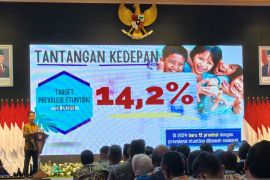The Coordinating Ministry for Human Development and Culture (gave a positive response to) the approval of the Maternal and Child Welfare Bill as an initiative by the House of RepresentativesJakarta (ANTARA) - Coordinating Human Development and Culture Minister Muhadjir Effendy responded positively to the approval of the Draft Law on Maternal and Child Welfare as the House of Representatives' (DPR's) initiative to be discussed with the government.
"The Coordinating Ministry for Human Development and Culture (gave a positive response to) the approval of the Maternal and Child Welfare Bill as an initiative by the House of Representatives," Minister Effendy stated on being contacted here on Saturday.
The bill was expected to support efforts to reduce the rate of stunting prevalence, he remarked.
Currently, the government is pursuing the target to push down the rate of stunting to 14 percent by 2024.
Related news: Ministry invites families to join effort to prevent childhood stunting
"The program of the eradication of stunting has been running in accordance with Law Number 52 of 2009 on population development and family development and Presidential Regulation Number 72 of 2021 on Stunting Reduction as a legal basis," he pointed out.
Once the bill was ratified, Effendy expects that it will improve the efforts to push down the stunting rate.
Under article 4, paragraph 2 of the draft bill, there is a suggestion to give six months of maternity leave to women, who had given birth.
This proposal of extended maternity leave was expected to allow mothers to provide exclusive breastfeeding for their babies, as part of the efforts to prevent stunting.
The minister reiterated that the prevalence of stunting should decrease by three percent per year to 14 percent in 2024.
Related news: Emotional mental disorders continue to increasingly afflict teenagers
"The current rate of stunting prevalence is 24.4 percent. Meanwhile, the president targets the stunting rate to decrease to 14 percent by 2024. To achieve this target, the stunting prevalence must decrease by three percent per year," he elaborated.
He cited data from the National Toddler Nutrition Status Survey (SSGBI) in 2021, which stated that as many 5.33 million children under five, or 24.4 percent, experience stunted growth.
"Why is this stunting reduction program important? (It is) because the first one thousand days of life is a (vital) period to ensure the (continuity) of Indonesia's next generation," he concluded.
Related news: Stunting eradication requires strong commitment from families: BKKBN
Related news: Poverty not the chief cause of stunting: BKKBN
Translator: Wuryanti P, Mecca Yumna
Editor: Fardah Assegaf
Copyright © ANTARA 2022












